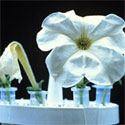Floriculture Biotechnology
Our research is focused on using biotechnology and genetics to improve horticultural performance of floriculture crops. The goal of this lab is to serve as a bridge between basic molecular biology and applied horticulture.
Who We Are
The Floriculture Biotechnology group has a broad range of expertise that allows us to conduct research on many areas of plant molecular biology. We conduct research in the areas of functional genomics (ESTs), gene expression, genetic transformation, plant breeding and plant physiology with the ultimate goal of producing better floriculture crops through biotechnology.
Click here for a list of publications.
Current Projects
Experiments on ethylene-insensitivity in transgenic Petunia
Over the last few years, our lab has engineered several lines of transgenic ethylene-insensitive petunias with the goal of making flowers that last longer. We have focused on cloning and engineering genes involved in ethylene perception and signal transduction such as ETR1, EIN2, EIL1, and EIL2. We have been using these plants as genetic tools to help understand the role of ethylene in various physiological processes such as floral senescence, adventitious root formation, seed germination, and more recently scent production.
Experiments on manipulation of floral volatiles in transgenic Petunias and Roses
We have generated several transgenic petunia lines engineered with knock-out (RNAi) or overexpression constructs for four genes involved in separate biochemical pathways that result in floral fragrance biosynthesis (rose oil, clove oil, and other sweet smelling volatile chemicals). Several of these genes show similar but complex transcriptional regulation, so we are working to determine the basis of this regulation by identifying genes encoding the transcription factors controlling expression of these genes. We are working with collaborators in the UF Dental School and UF-IFAS Food Science and Human Nutrition trying to understand how altering of floral volatile synthesis is perceived by humans. Most recently, we have started taking this work outside our petunia model system by initiating a project to genetically engineer long-stemmed red roses to make more rose oil for enhanced fragrance.
Foundational research tools for floriculture biotechnology (Petunia Genomics)
In the past five years, we have directed significant effort toward functional genomics research with petunia. The goal of the project is to determine the DNA sequence of a majority of the genes expressed in petunia flowers, then determine the genetic regulation of these genes. This information will ultimately lead to the discovery of new genes and promoters that can be utilized in floriculture crops to improve them through genetic engineering. As a result of this work, we have developed an EST database that is benefiting both academic and commercial researchers around the world in their efforts to understand flowering physiology, and engineer commercially viable floriculture crops.
Traditional breeding of Coleus for various horticultural characteristics
In the last three years we have built a conventional breeding program to produce new Coleus cultivars as a vegetative-propagated annual floriculture crop. Our main focus is to utilize Florida screening conditions to select for heat and light tolerant cultivars that do not change foliage color in sun or shade and do not produce flowers that lead to reduced foliage quality. We are also developing new trailing-habit varieties for use in the landscape, as well as for use as a potted plant. We have successfully released several new coleus varieties in the last year, and three of these have been licensed for commercialization for sale to the public beginning in 2006-7.


